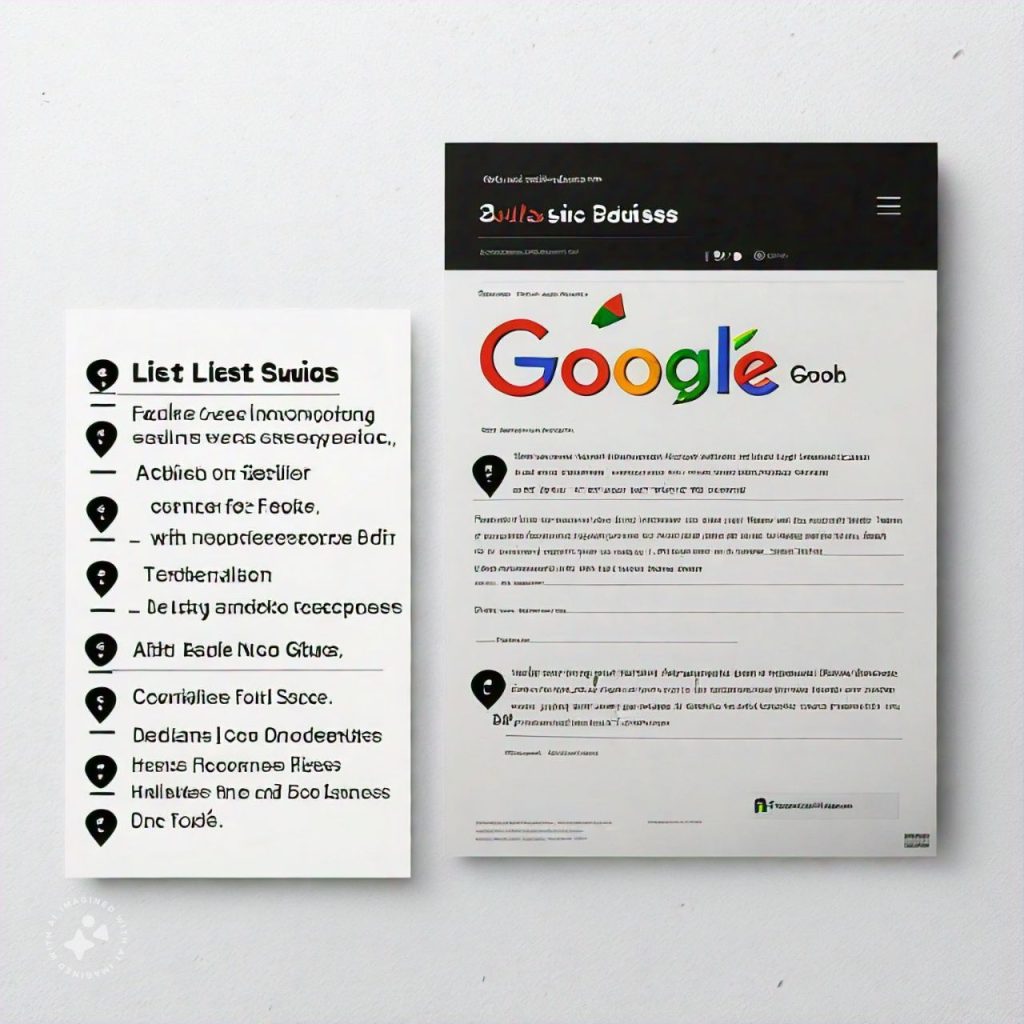The Importance of Local SEO for Small Businesses
The Importance of Local SEO for Small Businesses visibility is key for small businesses. But how can you ensure your business stands out in the crowded online marketplace? The answer lies in Local SEO.
Local SEO, or Local Search Engine Optimization, is a crucial aspect of online marketing. It focuses on optimizing a website to be found in local search results, driving more foot traffic, calls, and leads from nearby customers.

Why is this important? Consider this: more than 46% of all Google searches are seeking local information. That’s a huge potential customer base that your business could be missing out on if you’re not optimizing for local search. Local SEO is not just about reaching more people. It’s about reaching the right people. People who are in your area and are more likely to convert into customers.
But Local SEO is not just about getting your business to appear in local search results. It’s also about ensuring that your business information is accurate and consistent across the web. This includes your business name, address, and phone number, also known as NAP information.
Inaccurate NAP information can lead to lost business opportunities. Local SEO also involves managing online reviews, building local citations, and creating locally-focused content. These strategies can help improve your local search rankings, making your business more visible to potential customers in your area.

In this comprehensive guide, we’ll delve into the importance of Local SEO for small businesses. We’ll explore how it can impact your business and provide actionable strategies for improving your local search presence. Whether you’re a small business owner, a local business marketer, or an SEO specialist focusing on local SEO, you’ll find this guide useful and informative.
So, let’s dive in and explore the world of Local SEO. Your journey to improved local search visibility starts here.
Understanding Local SEO
Before we delve into the strategies, let’s first understand what Local SEO is. Local SEO is a subset of SEO. It focuses on optimizing a website to be found in local.

But what does this mean? When users perform a search on Google, the results they see are determined by a complex algorithm. This algorithm takes into account many factors. One of these factors is the location of the user. If a user searches for “coffee shop,” Google will show results of coffee shops in the user’s area.
This is where Local SEO comes into play. By optimizing your website for local search, you can increase your chances of appearing in these local search results. This can lead to increased visibility, more foot traffic, and ultimately, more business.

What is Local SEO?
Local SEO is all about increasing your online visibility for local searches. It’s about making sure that when someone in your area searches for a product or service you offer, your business shows up. But it’s not just about appearing in search results. It’s also about providing accurate and helpful information to potential customers. This includes your business hours, location, contact information, and more.

Local SEO also involves managing online reviews and creating locally-focused content. These strategies can help improve your local search rankings and build trust with your customers. In essence, Local SEO is about connecting with your local customers at the exact moment they’re looking for what you offer.
Why Local SEO is Crucial for Small Businesses
Now that we understand what Local SEO is, let’s explore why it’s crucial for small businesses. Firstly, Local SEO can help small businesses compete with larger companies. By focusing on a specific geographical area, small businesses can target customers in their local community.
This can level the playing field and allow small businesses to compete with larger companies on a local scale. Secondly, Local SEO can drive more foot traffic to your business. By appearing in local search results, you can attract more customers to your physical location. This can lead to increased sales and revenue.
Thirdly, Local SEO can improve your online visibility. By optimizing your website for local search, you can increase your chances of appearing in local search results. This can lead to increased brand awareness and recognition. Lastly, Local SEO can help build trust with your customers.
By managing online reviews and providing accurate business information, you can build a positive online reputation. This can lead to increased customer loyalty and repeat business. In conclusion, Local SEO is not just a nice-to-have strategy for small businesses. It’s a must-have strategy that can drive significant business growth.
The Local Search Ecosystem
The local search ecosystem is a complex network. It involves various platforms and technologies. These work together to provide users with the most relevant local search results. At the heart of this ecosystem is Google. Google’s search algorithm uses many factors to determine local search rankings.
These include relevance, distance, and prominence. Relevance refers to how well a local listing matches what someone is searching for. Distance considers how far each potential search result is from the location term used in a search. Prominence refers to how well-known a business is.
Google also uses information from various sources to validate and supplement the data it has about a business. These sources include business directories, review sites, and social media platforms. Understanding this ecosystem is crucial for effective Local SEO. By knowing how these elements interact, you can better optimize your online presence.
How Local Search Google Works
Local search Google is a powerful tool for businesses. It uses a complex algorithm to provide users with the most relevant local search results. When a user performs a local search, Google scans its index of the internet. It looks for content that is most relevant to the user’s query. Google then ranks these results based on hundreds of ranking factors.
These factors include the user’s location, the relevance of the content, and the authority of the website. Google also considers the user’s search history and settings. For example, if a user often clicks on a certain type of result, Google may prioritize similar results in the future.

The goal of Local SEO is to optimize your online presence. This is to increase your chances of appearing in these local search results. By understanding how local search Google works, you can better tailor your SEO strategies.
Key Players in Local SEO Search
There are several key players in the local SEO search ecosystem. These include search engines, business directories, review sites, and social media platforms. Search engines like Google, Bing, and Yahoo play a crucial role. They provide a platform where users perform local searches. Business directories like Yelp, Yellow Pages, and TripAdvisor are also important.
They provide valuable business information and customer reviews. Review sites like Google Reviews and Yelp Reviews influence local search rankings. They provide user-generated content and customer feedback. Social media platforms like Facebook, Instagram, and Twitter also play a role.
They provide platforms for businesses to engage with their local community. By understanding these key players, you can better navigate the local SEO search ecosystem. This can help you optimize your online presence and improve your local search rankings.
Optimizing Your Google My Business Listing
Google My Business (GMB) is a free tool from Google. It helps businesses manage their online presence across Google, including Search and Maps. By verifying and editing your business information, you can help customers find you. You can also tell them the story of your business.

GMB allows you to post updates to showcase what’s new. You can respond to reviews to build loyalty. Adding photos to show what you do is also possible. Businesses that add photos to their listings receive 42% more requests for directions on Google Maps. They also get 35% more clicks through to their websites than businesses that don’t.

The Role of Google My Business in Local SEO
Google My Business plays a crucial role in Local SEO. It directly feeds information to Google Search and Maps. This makes it a key factor in how your business appears in local search results. A well-optimized GMB listing can increase your business’s visibility on Google. It can also improve your local search rankings.
GMB allows you to control, index, and display pertinent business information. My Business (GMB) interacts with location-based searches, helping to verify a business’s legitimacy, drive qualified local traffic, and boost sales. It gives potential customers quick access to essential business information and directions.
How to Improve Your Google My Business for Better Visibility
Improving your Google My Business listing can significantly enhance your local search visibility.
Here are some steps to optimize your GMB listing:
- Verify your listing to ensure its accuracy and legitimacy.
- Provide complete and up-to-date information about your business.
- Include keywords in your business description.
- Regularly add new photos and update existing ones.
- Encourage customers to leave reviews and respond to them promptly.
- Use Google Posts to share updates and promotions.
- Add your business to relevant categories.
- Use a local phone number instead of a central, call center helpline.
- Make sure your business hours are accurate.
- Regularly check your listing for unauthorized changes.
By following these steps, you can improve your GMB listing. This can enhance your local search visibility. It can also increase your chances of appearing in Google’s Local Pack. The Local Pack is a set of three highlighted Maps-based listings. It appears at the top of the first page of local search results. Being featured in the Local Pack can significantly increase your online visibility. It can also drive more traffic to your website and physical location.
NAP Consistency and Local Citations
NAP stands for Name, Address, and Phone number. In the context of Local SEO, NAP consistency refers to the uniformity of your business information across the web. This includes your website, social media profiles, and directory listings.

NAP consistency is crucial for Local SEO. It helps search engines like Google to understand your business better. It also ensures that your customers can find accurate information about your business. Inconsistent NAP information can confuse search engines. It can also lead to a poor user experience.
Importance of Accurate NAP Information
Accurate NAP information is a key ranking factor in local search. Google uses NAP information to decide which businesses to show for geo-targeted searches. If your NAP information is inconsistent, Google may not trust your business. This can negatively impact your local search rankings.
Accurate NAP information also improves the customer experience. It ensures that potential customers can easily find and contact your business. This can lead to increased foot traffic and sales.
Building Local Citations for Local SEO
Local citations refer to any online mention of your NAP information. They can appear on business directories, websites, social platforms, or apps. Local citations help internet users to discover local businesses. They also impact local search engine rankings. Building local citations is a key component of Local SEO.
It can increase your business’s online visibility. It can also improve your local search rankings. To build local citations, you can submit your NAP information to reputable business directories. You can also reach out to local bloggers or news outlets. Remember to keep your NAP information consistent across all citations. This will help to improve your local search visibility and rankings.
Leveraging Reviews and Local SEO
Customer reviews play a vital role in Local SEO. They provide valuable feedback about your business. They also influence your local search rankings.

Reviews can affect your business’s online reputation. Positive reviews can attract more customers. Negative reviews, if not handled properly, can deter potential customers. Reviews also provide unique content for search engines. This can help to improve your local search visibility.
The Impact of Customer Reviews on Local Search Rankings
Customer reviews are a key ranking factor in local search. Google considers both the quantity and quality of reviews. A high number of positive reviews can improve your local search rankings. Reviews also influence click-through rates. Potential customers are more likely to click on businesses with positive reviews.
This can lead to increased website traffic and sales. Reviews can also provide valuable insights about your business. You can use this feedback to improve your products or services. This can lead to better customer satisfaction and more positive reviews.
Encouraging and Managing Online Reviews
Encouraging customer reviews should be a key part of your Local SEO strategy. You can ask your customers to leave a review after a purchase. You can also offer incentives, like discounts or freebies, for leaving a review Remember to respond to all reviews, both positive and negative.
This shows that you value your customers’ feedback. It can also help to improve your online reputation. Managing negative reviews is equally important. If you receive a negative review, respond promptly and professionally. Try to resolve the issue and turn the negative experience into a positive one. This can help to retain dissatisfied customers. It can also show potential customers that you care about customer satisfaction.

Local Backlinks and Their Significance
Backlinks are a crucial part of Local SEO. They are links from other websites that point to your site. These links can help to improve your local search visibility.

Backlinks are considered a vote of confidence by search engines. They indicate that your website provides valuable information. This can help to improve your local search rankings. Local backlinks, in particular, are very important. They are backlinks from websites that are relevant to your local area.
These links can help to establish your business as a local authority. They can also drive local traffic to your website. This can lead to increased foot traffic and sales. However, not all backlinks are created equal. The quality of the backlink is more important than the quantity. A few high-quality backlinks can have a greater impact than many low-quality ones.
What Are Local Backlinks?
Local backlinks are links from websites that are relevant to your local area. These could be local news sites, community blogs, or local business directories. They could also be links from local influencers or other local businesses. Local backlinks can help to establish your business as a local authority. They can also help to improve your local search visibility.
This is because search engines consider the relevance of the backlink. A backlink from a local website is more relevant for local search. This can help to improve your local search rankings. Local backlinks can also drive local traffic to your website. This can lead to increased foot traffic and sales.
How to Acquire Quality Local Backlinks
Acquiring quality local backlinks requires a strategic approach. You can start by creating valuable content that others want to link to. This could be blog posts, infographics, or videos. You can also reach out to local websites and ask for a link. This could be local news sites, community blogs, or local business directories.
You can offer to write a guest post or provide a quote for an article. You can also participate in local events or sponsorships. This can lead to backlinks from the event website or local news coverage. Remember, the quality of the backlink is more important than the quantity. A few high-quality backlinks can have a greater impact than many low-quality ones.
Content and Keywords for Local SEO
Content and keywords are the backbone of Local SEO. They help search engines understand what your business is about. They also help to attract and engage your local audience.

Content refers to the information on your website. This could be text, images, videos, or other forms of media. Your content should be relevant and valuable to your local audience. It should also be optimized with local keywords. Keywords are the words and phrases that people use to search online.
Local keywords are specific to your local area. They can help to improve your local search visibility. However, using local keywords effectively requires a strategic approach. Must understand what your local audience is searching for. You also need to create content that resonates locally.
Using Local Keywords Effectively
Local keywords are specific to your local area. They could include the name of your city, neighborhood, or landmarks. They could also include local slang or phrases.

Using local keywords effectively requires research. Understanding what your local audience is searching for is key. Use keyword research tools to identify popular local keywords and consider the intent behind searches. This will guide you in creating content that aligns with your audience’s needs. Once you’ve identified local keywords, integrate them strategically for maximum impact.
They should be included in your title tags, meta descriptions, and content. However, avoid keyword stuffing. This can lead to a poor user experience and can harm your search rankings. Instead, use your local keywords naturally and in context.
Creating Content That Resonates Locally
Creating content that resonates locally is crucial for Local SEO. Your content should be relevant and valuable to your local audience. It should also reflect your local knowledge and expertise. Local content can be created in various ways. Writing blog posts about local events or news helps engage the community. You can also develop guides or resources tailored to local interests. Additionally, sharing customer stories or testimonials adds a personal touch, building trust with your audience and enhancing local relevance.
Your content should also be optimized with local keywords. This can help to improve your local search visibility. However, remember to prioritize quality over quantity. High-quality content can attract and engage your audience. It can also encourage others to link to your website. This can help to improve your local search rankings.
Advanced Local SEO Strategies
Local SEO is not just about keywords and content. There are also advanced strategies that can help to improve your local search visibility. These strategies can give you a competitive edge. They can also help drive more foot traffic and increase online visibility.
One advanced strategy is the heatmap local SEO 5×5. This is a concept that helps businesses target local markets. Another advanced strategy is mobile optimization. This is crucial as more people are using mobile devices to search online. Let’s delve deeper into these advanced Local SEO strategies.
Heatmap Local SEO 5×5 Explained
The heatmap local SEO 5×5 is a concept in Local SEO. It helps businesses target their local markets more effectively. The idea is to focus on the areas where your customers are most active.

This could be a specific neighborhood or part of a city. You can use tools to create a heatmap of your local area. This can show you where your customers are coming from. You can then focus your Local SEO efforts on these areas. This can help to improve your local search visibility. It can also help to drive more foot traffic to your business.
Mobile Optimization and Local SEO
Mobile optimization is crucial for Local SEO. More people are using mobile devices to search online. This includes searching for local businesses. Your website needs to be mobile-friendly. This means it should look good and work well on mobile devices. It should also load quickly. Slow loading times can frustrate users and harm your search rankings.
You should also consider the user experience. Your website should be easy to navigate on a small screen. Your contact information should be easy to find. You should also make it easy for users to take action. This could be making a purchase, booking an appointment, or contacting you. Mobile optimization can help to improve your local search visibility. It can also provide a better user experience for your customers.
Measuring Your Local SEO Success
Local SEO is not a one-time effort. It requires ongoing monitoring and optimization. You need to track your performance to see if your efforts are paying off. This can help you to identify areas for improvement. It can also help you to see what is working well. You can then adjust your strategy accordingly. There are several key metrics to track in Local SEO.
These include your local search rankings, website traffic, and conversions. You should also monitor your online reviews and social media engagement. These can all provide valuable insights into your Local SEO performance. But how do you track these metrics? There are several tools that can help. Let’s take a closer look at these tools.
Tracking and Analyzing Local Search Performance
Tracking your local search performance is crucial. This can help you to see how well your Local SEO efforts are working. You can use tools like Google Analytics to track your website traffic. This can show you where your visitors are coming from. It can also show you what keywords they are using to find your website. You can also use Google Search Console to track your search rankings.
This can show you what keywords your website is ranking for. It can also show you how often your website appears in search results. You should also monitor your conversions. These are the actions that you want your visitors to take. This could be making a purchase, booking an appointment, or signing up for your newsletter.
Tools for Monitoring Local SEO
There are several tools that can help you monitor your Local SEO. These include Google Analytics, Google Search Console, and SEMrush. Google Analytics can help you track your website traffic. Google Search Console can help you track your search rankings. SEMrush can help you track your keyword rankings. It can also help you to identify new keyword opportunities.
There are also tools like Moz Local and Yext. These can help you manage your local citations and online reviews. You should choose the tools that best fit your needs and budget. These tools can provide valuable insights into your Local SEO performance. They can also help you to identify areas for improvement. This can help you to optimize your Local SEO strategy and achieve better results.
Partnering with Local SEO Companies
Local SEO can be complex. It requires a deep understanding of search engine algorithms. It also requires a lot of time and effort. For many small businesses, this can be overwhelming. That’s where local SEO companies come in. These are agencies that specialize in Local SEO. They have the expertise and resources to help your business succeed. But when should you consider hiring a local SEO company? Let’s explore this further.
When to Consider Hiring a Local SEO Company
There are several signs that you might need to hire a local SEO company. One is if your website is not ranking well in local search results. Another is if you’re not getting much traffic from local searches. You might also consider hiring a local SEO company if you don’t have the time or resources to manage your Local SEO.
Or if you’re not sure how to improve your Local SEO. A local SEO company can help you overcome these challenges. They can help you improve your local search rankings. They can also help you attract more local customers. But what are the benefits of working with local SEO experts? Let’s take a look.
Benefits of Working with Local SEO Experts
Working with local SEO experts has several benefits. First, they have the expertise to improve your local search rankings. They know the latest Local SEO strategies and techniques. They also understand the local search ecosystem. This can help you get ahead of your competitors. Second, they can save you time and effort. Local SEO can be time-consuming.
By outsourcing it to experts, you can focus on other aspects of your business. Third, they can provide ongoing support and maintenance. Local SEO is not a one-time effort. It requires ongoing optimization and monitoring. A local SEO company can provide this ongoing support. This can help you maintain your local search rankings over time.
In conclusion, partnering with local SEO companies can be a smart move for small businesses. It can help you improve your local search visibility and attract more local customers.
Future-Proofing Your Local SEO
Local SEO is not static. It’s constantly evolving. Search engine algorithms change. Consumer behaviors shift. New technologies emerge. To stay competitive, you need to future-proof your Local SEO. This means staying on top of trends. It also means being adaptable. Let’s explore how you can do this.
Upcoming Trends in Local SEO
Several trends are shaping the future of Local SEO. One is the rise of voice search. More people are using voice assistants to search for local businesses. This requires a new approach to keyword optimization. Another trend is the increasing importance of online reviews. Consumers are relying more on reviews to make purchasing decisions.
This means businesses need to focus more on managing their online reputation. Mobile optimization is also becoming more important. More consumers are using their mobile devices to search for local businesses. This means your website needs to be mobile-friendly. Finally, there’s the trend of hyperlocal marketing.
This involves targeting customers in a very specific, geographically restricted area. This requires a deep understanding of your local market.
Adapting to Changes in Local SEO
Adapting to changes in Local SEO can be challenging. But it’s necessary if you want to stay competitive. The first step is to stay informed. Keep up with the latest news and trends in Local SEO. You can do this by following SEO blogs and forums. The next step is to be flexible. Be willing to change your strategies and techniques as needed.
This might involve experimenting with new keywords or tactics. It might also involve investing in new tools or technologies. Finally, don’t be afraid to seek help. If you’re struggling to keep up with changes in Local SEO, consider hiring a local SEO company. They can provide the expertise and resources you need to stay ahead of the curve.
In conclusion, future-proofing your Local SEO requires staying informed, being flexible, and seeking help when needed. By doing so, you can ensure your business remains visible and competitive in local search results.
Conclusion and Next Steps
We’ve covered a lot of ground in this guide. Local SEO is a vast and complex field. But it’s also a crucial one for small businesses. By optimizing your Local SEO, you can increase your visibility. You can attract more customers. And you can grow your business.

But remember, Local SEO is not a one-time effort. It requires ongoing maintenance and adaptation. So, what’s next?
Recap of Local SEO Importance
Let’s recap why Local SEO is so important. First, it helps your business appear in local search results. This increases your visibility to potential customers. Second, it helps you compete with larger businesses. Even a small business can rank high in local search results. Finally, it helps you connect with your local community. This can lead to stronger customer relationships and loyalty.
Actionable Takeaways for Small Businesses
Here are some actionable takeaways from this guide:
- Optimize your Google My Business listing.
- Ensure NAP consistency across the web.
- Encourage and manage online reviews.
- Build quality local backlinks.
- Use local keywords in your content and metadata.
- Understand and leverage the heatmap local SEO 5×5.
- Optimize your website for mobile.
- Track and analyze your local search performance.
- Consider partnering with a local SEO company.
- Stay informed about trends and adapt your Local SEO strategies accordingly.
Remember, Local SEO is a journey, not a destination. Keep learning, keep experimenting, and keep optimizing. Your efforts will pay off in increased visibility, more customers, and business growth. Good luck on your Local SEO journey!


